- Share full article
Advertisement
Supported by

Carnival Cruises to Pay $20 Million in Pollution and Cover-Up Case

By Sarah Mervosh
- June 4, 2019
In 2016, Princess Cruise Lines agreed to pay a $40 million penalty for illegally dumping oil-contaminated waste into the sea and acts by employees to try to cover it up.
It was the largest criminal penalty ever imposed for intentional vessel pollution, and the Justice Department put the cruise line’s parent company, Carnival Corporation, on notice.
But that did not stop the company from polluting again, according to federal prosecutors.
On Monday, Carnival and its Princess line acknowledged violating probation terms from the 2016 case and were ordered to pay an additional $20 million penalty, putting further pressure on the world’s largest cruise corporation.
The new violations included discharging plastic into waters in the Bahamas, falsifying records and interfering with court supervision of ships by sending in teams ahead of inspections to pre-empt environmental violations, according to the corporation’s agreement with the Justice Department.
“A corporation is responsible to its shareholders and board of directors to be profitable, but not by breaking the law and destroying the very environment in which it navigates for profit,” Ariana Fajardo Orshan, the United States attorney for the Southern District of Florida, said in a statement .
The agreement came after the federal judge overseeing the case, Patricia A. Seitz, expressed frustration with Carnival’s “repeat offenses” and even threatened to bar its cruise ships from docking at United States ports. She ordered the corporation’s top executives to appear in person at a court hearing on Monday in Miami.
“I do take responsibility for the problems we have,” the corporation’s chief executive, Arnold W. Donald, said at the hearing, according to The Miami Herald . “I am extremely disappointed that we’ve had them. I know you have reservations about our commitment and who we are. I want you to know we are fully committed.”
Vessel pollution is just one of the many human-caused hazards facing ocean life today. Ship traffic and noise can cause the death of sea creatures ; marine animals routinely turn up dead with plastic in their stomachs ; and rising sea temperatures, stemming from climate change caused by human activity, are destroying the framework of many ocean ecosystems .
For decades, cruise lines — including Carnival — have been closely watched for violations of environmental rules. And even the most efficient cruise ships can emit three to four times as much carbon dioxide per passenger-mile as an airplane jet can.
Carnival, based in Miami, is a global operation that has a strong hold on the cruise market. In addition to Princess, its cruise lines include Carnival Cruise Line, Holland America Line and Seabourn. Together, the various brands serve about 11 million travelers each year, about 50 percent of the global cruise market, according to the company’s website .
Carnival’s stock market value is estimated to be nearly $35 billion.
In 2002, Carnival was ordered to pay $18 million in fines after pleading guilty to criminal charges related to falsifying records of oil-contaminated bilge water that six of its ships had dumped into the sea.
The company came under additional scrutiny after Princess agreed, in 2016, to plead guilty to felony charges and pay the hefty $40 million penalty.
In that case, prosecutors said that employees of one of the company’s cruise ships, the Caribbean Princess, had used several means, including a device called a magic pipe, to circumvent water-cleaning mechanisms and digital devices monitoring oil levels. Officials said that four other Princess ships had also been found to have engaged in illegal practices to discharge waste.
The discharged waste included gray water — water that has been contaminated with food particles, grease and fat — and water found in the ship’s bilge, the bottom part of the ship where oil waste from engines can accumulate.
A whistleblower employee alerted the authorities and certain engineers ordered a coverup, including directing subordinates to lie, according to prosecutors.
One motive for the dumping, officials said, was to save money, because removing the waste from the ship at ports is expensive.
As part of the deal, Princess was put on probation for five years, and other Carnival cruise ship companies were subject to audits and oversight. During the first two years of monitoring, officials found “numerous violations,” from pollution to deception, according to federal prosecutors.
During an audit of the cruise ship Carnival Elation in December, for example, officials found that food waste had been mixed with plastic straws, aluminum and other miscellaneous items, which were “ready to be discharged down the chute and then overboard while at sea,” records show.
Federal prosecutors argued that the episode was representative of a widespread problem of plastic dumping involving many ships, over many years, “despite full knowledge that such discharges are illegal and extremely harmful to the environment and marine life.”
Carnival has said it is making changes, including a commitment to reducing its plastic use. For example, it said it would eliminate drinking straws, except for in frozen drinks, which would be served with an edible straw. It also said rooms and spas would offer shampoo and conditioner in pump-top bottles, mirroring a trend in the hotel industry away from single-use toiletries .
“Carnival Corporation remains committed to environmental excellence and protecting the environment in which we live, work, and travel,” the company said on Monday in a statement . “Our aspiration is to leave the places we touch even better than when we first arrived.”
According to the court agreement, the company, which remains on probation for three more years, must also create a plan and make changes to its corporate structure. If it fails to meet certain deadlines by the fall, it could be forced to pay up to $10 million per day.
Follow Sarah Mervosh on Twitter: @smervosh .
Come Sail Away
Love them or hate them, cruises can provide a unique perspective on travel..
Cruise Ship Surprises: Here are five unexpected features on ships , some of which you hopefully won’t discover on your own.
Icon of the Seas: Our reporter joined thousands of passengers on the inaugural sailing of Royal Caribbean’s Icon of the Seas . The most surprising thing she found? Some actual peace and quiet .
Th ree-Year Cruise, Unraveled: The Life at Sea cruise was supposed to be the ultimate bucket-list experience : 382 port calls over 1,095 days. Here’s why those who signed up are seeking fraud charges instead.
TikTok’s Favorite New ‘Reality Show’: People on social media have turned the unwitting passengers of a nine-month world cruise into “cast members” overnight.
Dipping Their Toes: Younger generations of travelers are venturing onto ships for the first time . Many are saving money.
Cult Cruisers: These devoted cruise fanatics, most of them retirees, have one main goal: to almost never touch dry land .
Cruise industry faces choppy seas as it tries to clean up its act on climate
- Medium Text
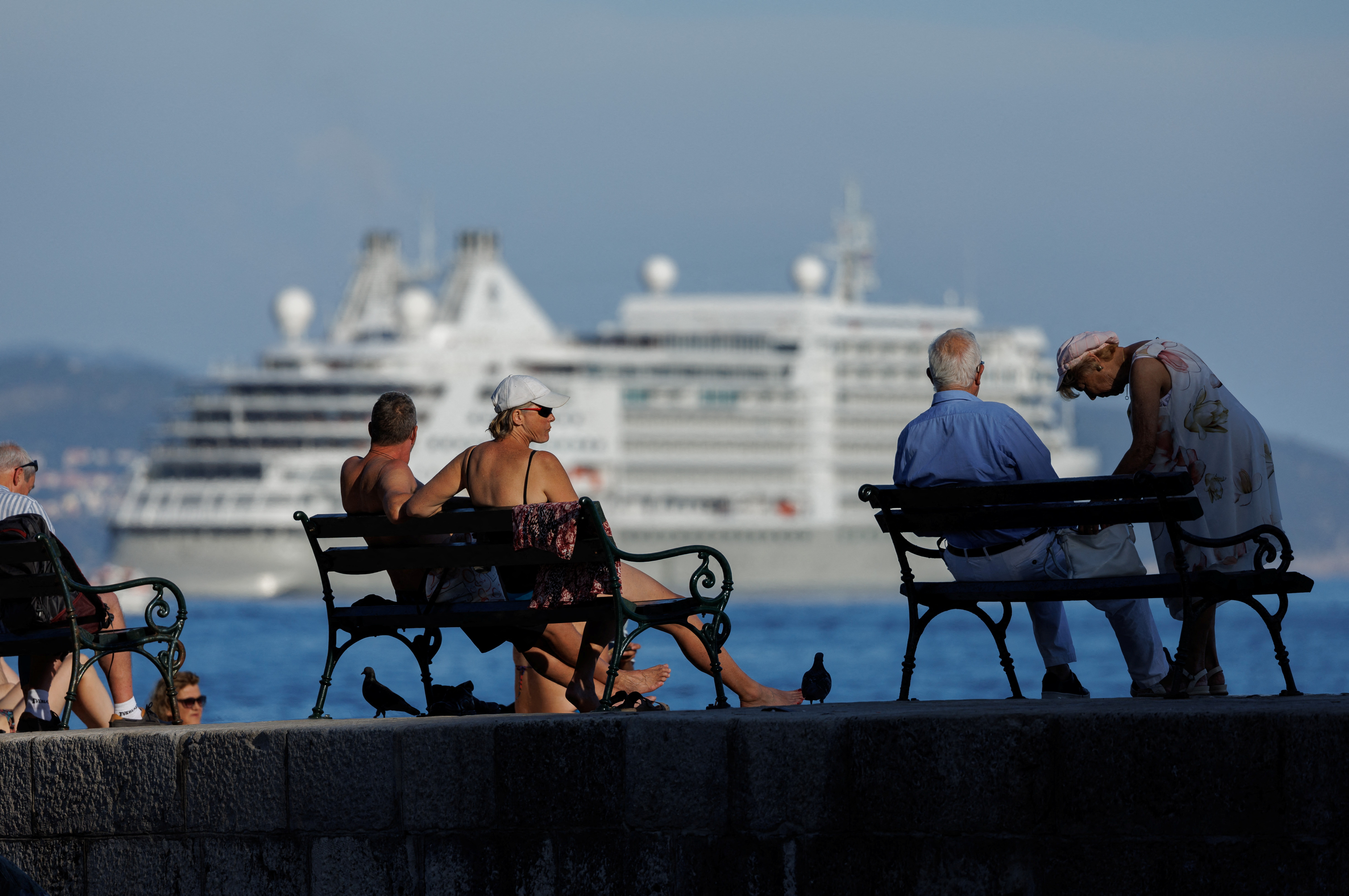
- The cruise industry is the fastest growing in tourism and is expected to exceed pre-COVID record highs in passenger numbers and revenues by next year
- The industry promises to make zero-emission vessels and fuels widespread by 2030, and to achieve a goal of 'net-zero carbon' cruising by 2050
- Environmental groups cite its record on pollution, greenhouse gas emissions, and over-tourism, and raise doubts about its ability to reach goals
- Concerns include widespread use of "scrubbers", LNG as transition fuel, and limited capacity for shore-based power in ports
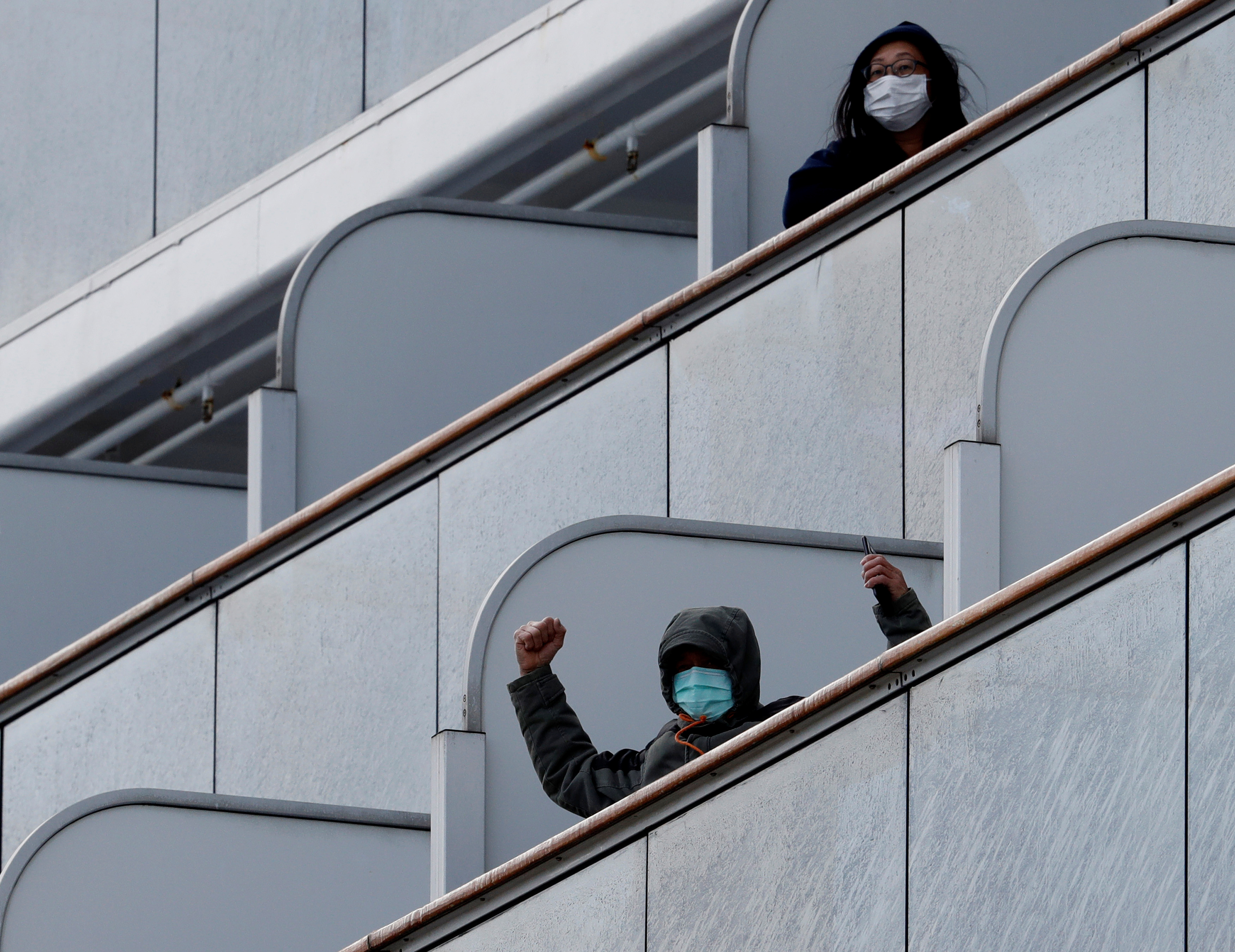
Caroline Palmer is a freelance journalist specialising in business, health, sustainability and the artisan economy. She has worked for the Financial Times, The Guardian and The Observer and is a contributor to Ethical Corporation magazine.
Read Next / Editor's Picks
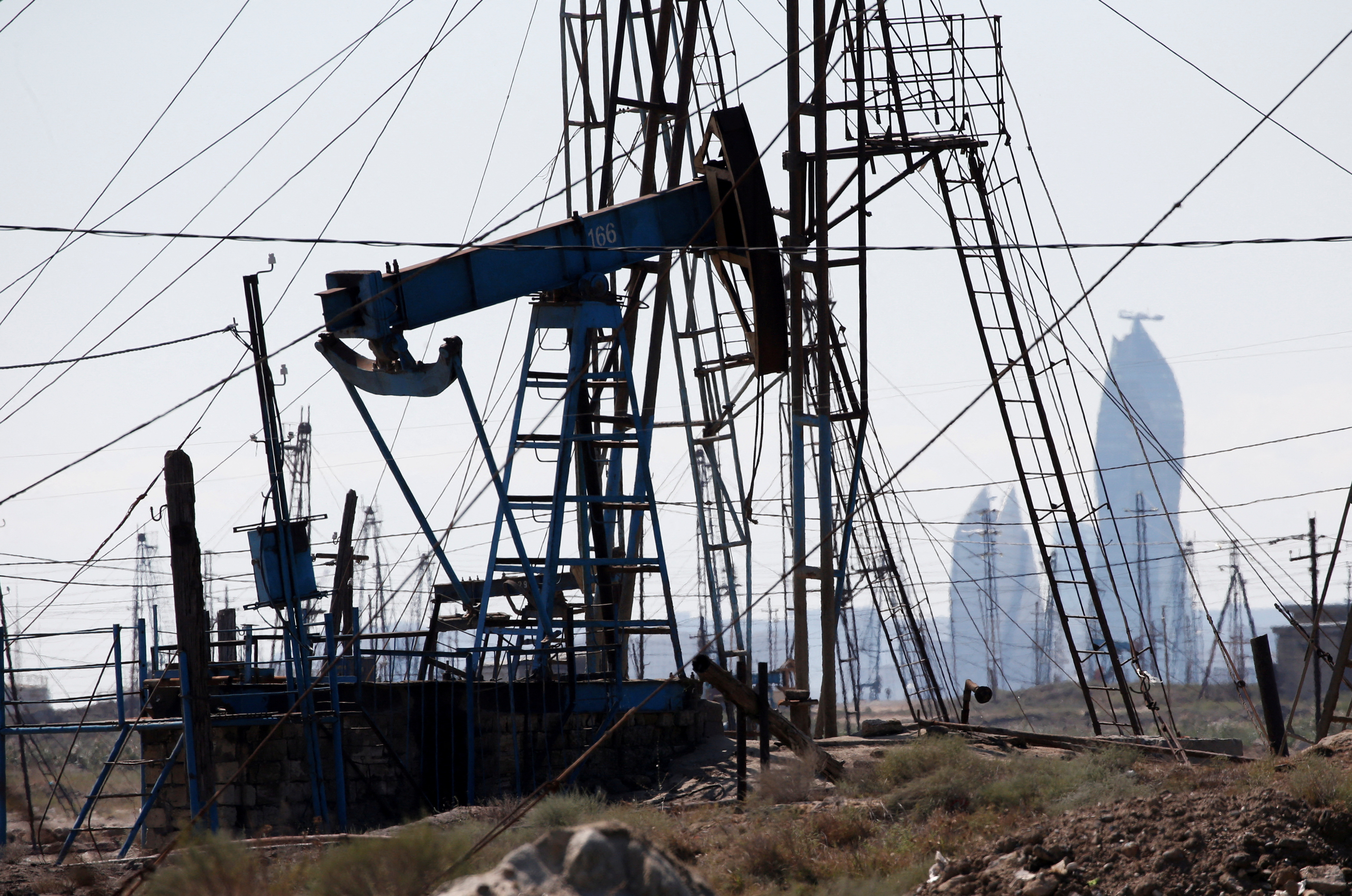

An official website of the United States government
Here's how you know
Official websites use .gov A .gov website belongs to an official government organization in the United States.
Secure .gov websites use HTTPS A lock ( Lock A locked padlock ) or https:// means you’ve safely connected to the .gov website. Share sensitive information only on official, secure websites.
- The Attorney General
- Organizational Chart
- Budget & Performance
- Privacy Program
- Press Releases
- Photo Galleries
- Guidance Documents
- Publications
- Information for Victims in Large Cases
- Justice Manual
- Business and Contracts
- Why Justice ?
- DOJ Vacancies
- Legal Careers at DOJ
- Our Offices
Archived Press Releases
Archived News
Para Notícias en Español
Princess Cruise Lines to Pay Largest-Ever Criminal Penalty for Deliberate Vessel Pollution
Princess Cruise Lines Ltd. (Princess) has agreed to plead guilty to seven felony charges stemming from its deliberate pollution of the seas and intentional acts to cover it up. Princess will pay a $40 million penalty– the largest-ever criminal penalty involving deliberate vessel pollution – and plead guilty to charges related to illegal dumping of oil contaminated waste from the Caribbean Princess cruise ship. The plea agreement was announced today by Assistant Attorney General John C. Cruden for the Department of Justice’s Environment and Natural Resources Division and U.S. Attorney Wifredo A. Ferrer for the Southern District of Florida in Miami, Florida.
Princess, headquartered in Santa Clarita, California, is a subsidiary of Carnival Corporation (Carnival), which owns and operates multiple cruise lines and collectively comprises the world’s largest cruise company. Carnival is headquartered in Miami. As part of the plea agreement with Princess, cruise ships from eight Carnival cruise line companies (Carnival Cruise Line, Holland America Line N.V., Seabourn Cruise Line Ltd. and AIDA Cruises) will be under a court supervised Environmental Compliance Program (ECP) for five years. The ECP will require independent audits by an outside entity and a court appointed monitor.
The charges to which Princess will plead guilty concern the Caribbean Princess cruise ship which visited various U.S. ports in Florida, Maine, Massachusetts, New Jersey, New York, Puerto Rico, Rhode Island, South Carolina, Texas, U.S. Virgin Islands and Virginia. The U.S. investigation was initiated after information was provided to the U.S. Coast Guard by the British Maritime and Coastguard Agency (MCA) indicating that a newly hired engineer on the Caribbean Princess reported that a so-called “magic pipe” had been used on Aug. 23, 2013, to illegally discharge oily waste off the coast of England. The whistleblowing engineer quit his position when the ship reached Southampton, England. The chief engineer and senior first engineer ordered a cover-up, including removal of the magic pipe and directing subordinates to lie. The MCA shared evidence with the U.S. Coast Guard, including before and after photos of the bypass used to make the discharge and showing its disappearance. The U.S. Coast Guard conducted an examination of the Caribbean Princess upon its arrival in New York City, New York, on Sept. 14, 2013, during which certain crew members continued to lie in accordance with orders they had received from Princess employees.
According to papers filed in court, the Caribbean Princess had been making illegal discharges through bypass equipment since 2005, one year after the ship began operations. The discharge on Aug. 26, 2013, involved approximately 4,227 gallons, 23 miles off the coast of England within the country’s Exclusive Economic Zone. At the same time as the discharge, engineers simultaneously ran clean seawater through the ship’s overboard equipment in order to create a false digital record for a legitimate discharge.
Caribbean Princess used multiple methods over the course of time to pollute the seas. Prior to the installation of the bypass pipe used to make the discharge off the coast of England, a different unauthorized valve was used. When the Department of Justice investigative team conducted a consensual boarding of the ship in Houston, Texas, on March 8, 2014, they found the valve that crew members had described. When it was removed by Princess at the department’s request, it was found to contain black oil.
In addition to the use of a magic pipe to circumvent the oily water separator and oil content monitor required pollution prevention equipment, the U.S. investigation uncovered two other illegal practices which were found to have taken place on the Caribbean Princess as well as four other Princess ships – Star Princess , Grand Princess , Coral Princess and Golden Princess . One practice was to open a salt water valve when bilge waste was being processed by the oily water separator and oil content monitor. The purpose was to prevent the oil content monitor from otherwise alarming and stopping the overboard discharge. This was done routinely on the Caribbean Princess in 2012 and 2013. The second practice involved discharges of oily bilge water originating from the overflow of graywater tanks into the machinery space bilges. This waste was pumped back into the graywater system rather than being processed as oily bilge waste. Neither of these practices were truthfully recorded in the oil record book as required. All of the bypassing took place through the graywater system which was discharged when the ship was more than four nautical miles from land. As a result, discharges within U.S. waters were likely.
“The pollution in this case was the result of more than just bad actors on one ship,” said Assistant Attorney General Cruden. “It reflects very poorly on Princess’s culture and management. This is a company that knew better and should have done better. Hopefully the outcome of this case has the potential not just to chart a new course for this company, but for other companies as well.”
“The conduct being addressed today is particularly troubling because the Carnival family of companies has a documented history of environmental violations, including in the Southern District of Florida,” said U.S. Attorney Ferrer. “Our hope is that all companies abide by regulations that are in place to protect our natural resources and prevent environmental harm. Today’s case should send a powerful message to other companies that the U.S. government will continue to enforce a zero tolerance policy for deliberate ocean dumping that endangers the countless animals, marine life and humans who rely on clean water to survive.”
“The safety, security and environmental stewardship of our ports, waterways and oceans is an important Coast Guard mission set and the complexity of the challenges we face today requires a global unity of effort among law enforcement partners,” said Rear Admiral Scott Buschman Commander, Coast Guard District Seven. “I sincerely thank the U.S. Attorney and the United Kingdom Maritime and Coastguard Agency for your leadership, your collaboration and the hard work put forth to reach a plea agreement with significant penalties that serve as a clear warning to all polluters.”
“This shows just how well the U.K. and U.S. can work together on these kind of cases,” said Jeremy Smart, head of enforcement at the Maritime & Coastguard Agency of the United Kingdom. “It also sends a clear message to the industry that this kind of pollution practice will not be tolerated anywhere in the world. It also shows that we will always take any information we are given by those who report such practices to us very seriously and will act upon it.”
In addition to the criminal information, a plea agreement and joint factual statement were today filed in court in Miami. Photographs of some of the evidence provided by the whistleblower and obtained by the government were also filed in federal court. In the factual statement, Princess also admitted to the following:
Illegal discharges took place on the Caribbean Princess dating back to 2005, one year after the vessel started operations, as part of a conspiracy to violate the Act to Prevent Pollution from Ships and to obstruct justice.
Different bypass methods were used over the course of time, including a “magic pipe” used to transfer oily waste overboard.
After learning that an engineer had blown the whistle, senior ship engineers dismantled the bypass pipe and instructed crew members to lie.
Prior to the MCA boarding, the chief engineer and senior first engineer ordered crew members to lie. Following the MCA’s inquiry, the chief engineer held a sham meeting in the engine control room to pretend to look into the allegations while holding up a sign stating: “LA is listening.” The engineers present understood that anything said might be heard by those at the company’s headquarters in Los Angeles, California, because the engine control room contained a recording device intended to monitor conversations in the event of an incident.
When using the magic pipe, engineers processed sea water through the oily water separator in order to create a digital record to account for the missing waste.
Shore-side management failed to provide and exercise sufficient supervision and management controls to prevent or detect criminal violations by Caribbean Princess crew members.
A perceived motive for the crimes was financial – the chief engineer that ordered the dumping off the coast of England told subordinate engineers that it cost too much to properly offload the waste in port and that the shore-side superintendent who he reported to would not want to pay the expense.
Princess engineers on the Caribbean Princess indicated that the chief engineer responsible for the discharge on Aug. 26, 2013, was known as “ broccino corto ” (a person with short arms), an Italian expression for a cheap person whose arms are too short to reach his wallet. Some expressed the same opinion of the shore-side superintendent.
Graywater tanks overflowed into the bilges on a routine basis and were pumped back into the graywater system and then improperly discharged overboard when they were required to be treated as oil contaminated bilge waste. The overflows took place when internal floats in the graywater collection tanks got stuck due to large amounts of fat, grease and food particles from the galley that drained into the graywater system. Graywater tanks overflowed at least once a month and, at times, as frequently as once per week. Princess had no written procedures or training for how internal gray water spills were supposed to be cleaned up and the problem remained uncorrected for many years.
Princess discovered “stub pipes” along the entire length of the ship for the apparent purpose of pumping graywater overflows into the bilges back into the graywater system and subsequently overboard.
According to papers filed in court, Princess has undertaken remedial measures in response to the government’s investigation, including upgrading the oily water separators and oil content monitors on every ship in its fleet and instituting many new policies.
If approved by the court, $10 million of the $40 million criminal penalty will be devoted to community service projects to benefit the maritime environment; $3 million of the community service payments will go to environmental projects in South Florida; $1 million will be earmarked for projects to benefit the marine environment in United Kingdom waters.
Today’s prosecution was made possible through the combined efforts of the U.S. Coast Guard Investigative Service, the U.S. Coast Guard 7 th District Legal Office, U.S. Coast Guard’s Office of Maritime and International Law and U.S. Coast Guard Office of Investigations and Analysis. In announcing the case, Assistant Attorney General Cruden and U.S. Attorney Ferrer expressed their appreciation to the U.K.’s MCA for their cooperation and assistance. The case was prosecuted by Richard A. Udell, Senior Litigation Counsel with the Environmental Crimes Section of the Department of Justice and Thomas Watts-FitzGerald, Deputy Chief, Economic & Environmental Crimes Section for the Southern District of Florida.
Related Content
The Justice Department’s Environment and Natural Resources Division (ENRD) released the Division’s Accomplishments for Fiscal Year (FY) 2023 in commemoration of Earth Day on April 22.
The Justice Department and the Environmental Protection Agency (EPA) reached a settlement with Colonial Oil Industries Inc. that will require the company to pay a civil penalty of more than...
- Skip to main content
- Keyboard shortcuts for audio player

Environment Story Of The Day NPR hide caption
Environment
- LISTEN & FOLLOW
Your support helps make our show possible and unlocks access to our sponsor-free feed.
Carnival Corp. Agrees To $20 Million Fine For Pollution Violations
Executives with Carnival Corporation, the world's largest cruise line, were in court explaining why its ships continue to dump plastics and other pollutants into waters in the Caribbean and Alaska.
RACHEL MARTIN, HOST:
A remarkable scene unfolded in a Miami courtroom - the head of the world's largest cruise line company, Carnival, stood before a federal judge and pleaded guilty to six counts of violating probation. Carnival has been on probation for more than two years for environmental violations, including dumping plastics and oily water off Alaska and in the Caribbean. NPR's Greg Allen was in the courtroom yesterday and joins us now. Tell me more, Greg, about what Carnival is accused of.
GREG ALLEN, BYLINE: Hi, Rachel. Yeah. Well, Carnival's had a long history of violations of dumping plastic trash and oily discharge from its ships. Violations go back to 1993, and they've continued in recent years. Two years ago, Carnival agreed to pay a $40-million fine after one of its ships on the Princess line was caught dumping oily water, and also, they were caught falsifying their books. Judge Seitz placed the company on probation - this is Judge Patricia Seitz in Miami. She told them to clean up its act, and she ordered ongoing audits, inspections to make sure the company's ships comply with environmental laws.
But a court-appointed monitor who's conducting these inspections found that Carnival had actually created a special team that would go to ships beforehand that were due to be inspected and correct things before inspectors arrived. The court also found other instances that they - the company was falsifying records and dumping plastics in the ocean. So all of which convinced the judge yesterday that the company was more interested in protecting its bottom line than the environment, and she said so in court.
MARTIN: What was it like in the courtroom?
ALLEN: Well, the judge is very frustrated with the company - had, you know, brought all the company officials there. We had more than a dozen company officials, including the CEO Arnold Donald, the chairman Micky Arison. Ultimately, the judge approved an agreement by which Carnival pleads guilty to violating probation and pays a $20-million fine. The company will also change its corporate structure to make compliance with environmental regulations a priority, perhaps for the first time. And it says it's going to change how it deals with plastics and food waste, by kind of creating these teams that will go and kind of create whole new systems on the ships. They're going to move to reduce single-use plastics on its ships, they say.
And all this is going to be subject to court supervision. And to convince the judge it's serious this time, Carnival says it's going to have a compliance plan in place by mid-August. And they're going to pay a fine - they've agreed to pay a fine of more than $1 million a day if the plan is not ready by then.
MARTIN: I mean, does that mean they have to pull all their cruise-liners to make those changes?
ALLEN: Well, it's interesting because at at one point, the judge - at an earlier hearing, the judge was so frustrated with Carnival and the fact that they'd continued to violate these - this probation order that she threatened to block Carnival from docking at U.S. ports. She said she was hearing from passengers who are worried about their - their cruises would be canceled.
I think it was all really a sign of the frustration of Judge Patricia Seitz, who's been hearing this case for two years. In court, she says she became convinced that the employees of Carnival wanted to do the right thing on the environment, but it was the company itself, the top executives - including its CEO and the chairman of the board - that she became convinced weren't serious about complying with environmental laws. So that's why she wanted them all there yesterday, and they were.
MARTIN: So what's the next step here?
ALLEN: Well, now they've got this agreement in place. They're going to come up with this plan. I think the judge really wanted to talk to the company's CEO, Arnold Donald, and she lectured him on the need, as she said, to be a steward of the environment. But there are skeptics, like Kendra Ulrich. She's an environmentalist with a group called Stand.earth. Here's what she had to say about it.
KENDRA ULRICH: It is in no way acceptable for a corporate actor to continually get a slap on the wrist and let off the hook. Clearly, these environmental compliance programs are not working.
ALLEN: And Judge Seitz, still skeptical herself, but she says there will be continued court supervision.
MARTIN: All right. NPR's Greg Allen, reporting from Miami. Greg, thanks. We appreciate it.
ALLEN: You're welcome.
(SOUNDBITE OF SIGNAL HILL'S "LLANGOLLEN")
Copyright © 2019 NPR. All rights reserved. Visit our website terms of use and permissions pages at www.npr.org for further information.
NPR transcripts are created on a rush deadline by an NPR contractor. This text may not be in its final form and may be updated or revised in the future. Accuracy and availability may vary. The authoritative record of NPR’s programming is the audio record.
Carnival to pay $20M for violating probation on previous ocean pollution conviction
Carnival paid a $40m fine as a result of a 2016 criminal conviction for dumping oily waste.
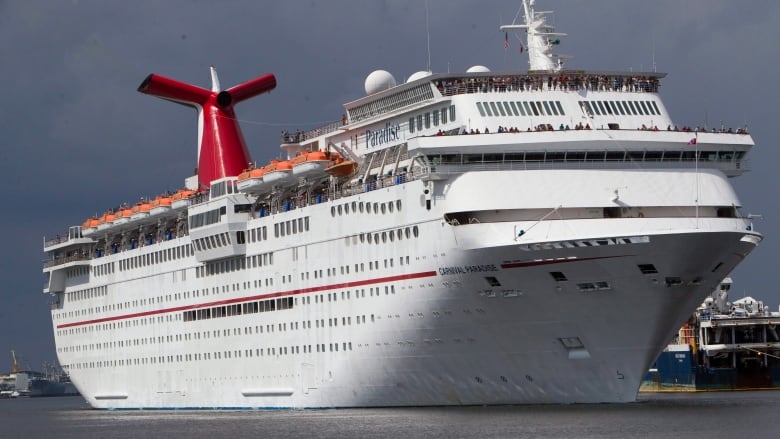
Social Sharing
Carnival Corp. has reached a settlement with federal prosecutors in which the world's largest cruise line agreed to pay a $20-million US penalty because its ships continued to pollute the oceans despite a previous criminal conviction aimed at curbing similar conduct.
On Monday in Miami, senior U.S. District Judge Patricia Seitz approved the agreement after Carnival CEO Arnold Donald stood up in open court and admitted the company's responsibility for probation violations stemming from the previous environmental case.
"The company pleads guilty," Arnold said six times in a packed courtroom that included other senior Carnival executives, including company chairman and Miami Heat owner Micky Arison.
"We acknowledge the shortcomings. I am here today to formulate a plan to fix them," Arnold added
"The proof will be in the pudding, won't it?" the judge replied. "If you all did not have the environment, you would have nothing to sell."
- Cruise ship pollution inspectors on the chopping block in Alaska
- What on Earth? Less smoke on the water: How ship operators are charting a greener course
Carnival admitted violating terms of probation from a 2016 criminal conviction for discharging oily waste from its Princess Cruise Lines ships and covering it up. Carnival paid a $40-million fine and was put on five years' probation in that case, which affected all nine of its cruise brands that boast more than 100 ships.
Time and time again, Carnival has shown its contempt of environmental laws and the rule of law - Attorney Knoll Lowney
Now Carnival has acknowledged that in the years since its ships committed environmental crimes such as dumping "grey water" in prohibited places such Alaska's Glacier Bay National Park and knowingly allowing plastic to be discharged along with food waste in the Bahamas, which poses a severe threat to marine life.
The company also admitted falsifying compliance documents and other administrative violations such as having cleanup teams visit its ships just before scheduled inspections.
At an earlier hearing, Seitz threatened to bar Carnival from docking at U.S. ports because of the violations and said she might hold executives individually liable for the probation violations.
"The concern I have is that senior management has no skin in the game."
Seitz said future violations might be met with prison time and criminal fines for individuals.
"My goal is to have the defendant change its behaviour."
Hefty daily penalties if conditions not met
Under the settlement, Carnival promised there will be additional audits to check for violations, a restructuring of the company's compliance and training programs, a better system for reporting environmental violations to state and federal agencies, and improved waste management practices.
The agreement also would set Sept. 13 and Oct. 9 deadlines to create an improved compliance plan and make other changes, subject to fines of $1 million per day if those deadlines are not met. If a second round of deadlines are not met, the fines could go up to $10 million a day.
Other proposed changes include a reduction by Carnival in the use of single-use plastic items across its entire fleet, and creation of "tiger teams" meant to make improvements in the ships' food and beverage systems and how waste is handled at sea.
Seitz is retiring later this year and is turning over the case to U.S. District Judge Ursula Ungaro, who jointly presided over Monday's hearing.
Three people who claimed they were victims of Carnival's environmental violations attended the hearing. Their lawyer, Knoll Lowney, expressed skepticism that Carnival will keep its word this time.
"Time and time again, Carnival has shown its contempt of environmental laws and the rule of law," he said. "Here we are again."
- Work & Careers
- Life & Arts
Become an FT subscriber
Try unlimited access Only $1 for 4 weeks
Then $75 per month. Complete digital access to quality FT journalism on any device. Cancel anytime during your trial.
- Global news & analysis
- Expert opinion
- Special features
- FirstFT newsletter
- Videos & Podcasts
- Android & iOS app
- FT Edit app
- 10 gift articles per month
Explore more offers.
Standard digital.
- FT Digital Edition
Premium Digital
Print + premium digital, weekend print + standard digital, weekend print + premium digital.
Today's FT newspaper for easy reading on any device. This does not include ft.com or FT App access.
- 10 additional gift articles per month
- Global news & analysis
- Exclusive FT analysis
- Videos & Podcasts
- FT App on Android & iOS
- Everything in Standard Digital
- Premium newsletters
- Weekday Print Edition
- FT Weekend Print delivery
- Everything in Premium Digital
Essential digital access to quality FT journalism on any device. Pay a year upfront and save 20%.
- Everything in Print
Complete digital access to quality FT journalism with expert analysis from industry leaders. Pay a year upfront and save 20%.
Terms & Conditions apply
Explore our full range of subscriptions.
Why the ft.
See why over a million readers pay to read the Financial Times.
International Edition
Cruise ships are notorious for polluting the ocean, and Carnival and Royal Caribbean are some of the worst offenders
- Carnival Corp and Royal Caribbean Cruises do a poor job of limiting the pollution from their ships, according to the environmental-advocacy group Friends of the Earth .
The group graded 16 cruise lines based on how they treat their sewage, the steps they've taken to limit air pollution at ports, whether they follow water-pollution rules in Alaska, and the quality of information they provided about their environmental practices to Friends of the Earth.
- Disney Cruise Line was the only business to earn a grade higher than a C-, and no Carnival or Royal Caribbean examined by Friends of the Earth earned a grade higher than a D+.
- Visit Business Insider's homepage for more stories.

Carnival Corp and Royal Caribbean Cruises are the world's biggest cruise companies , but they're also among the worst at limiting the pollution from their ships, according to the environmental-advocacy group Friends of the Earth .
Read more: Carnival, Royal Caribbean, and Norwegian Cruise Line are in a fierce battle for domination in the cruise industry — here's how they stack up
Disney Cruise Line was the only business to earn a grade higher than a C-, and no cruise line owned by Carnival or Royal Caribbean earned a grade higher than a D+. (Every cruise line owned by Carnival that Friends of the Earth graded automatically received an F since the company admitted in June to violating the terms of its probation from a 2017 conviction for improper waste disposal.)
"We really feel as though the industry has not improved in a way that we think they should be, especially with the continued, significant profits they make annually," Marcie Keever, the oceans and vessels program director at Friends of the Earth, said in an interview with Business Insider.
Here's how the six cruise companies included in Friends of the Earth's list fared. Business Insider assigned each possible letter-grade a point value (an F is worth zero points, while an A+ is worth 12 points) and determined the average score earned by each company's cruise lines.
Tied: 6. Carnival Corp — 0
Carnival Cruise Line: 0
Costa Cruises: 0
Cunard Line: 0
Holland America Line: 0
P&O Cruises: 0
Princess Cruises: 0
Seabourn Cruise Line: 0
"This report is inaccurate and misleading," a Carnival representative said. "Our fleet includes Advanced Air Quality Systems on more than 70 more of our ships and we have shore power capability on just under 50% of our fleet. Plus we have the latest advancements in our treatment plants installed on board (and each of these technologies are included on our new ships — and we have 18 new ships on order). We also are the first cruise company to install LNG to power our ships."
Tied: 6. Mediterranean Shipping Company — 0
MSC Cruises: 0
Tied: 6. Genting Hong Kong — 0
Crystal Cruises: 0
Tied: 3. Royal Caribbean Cruises — 2.33
Celebrity Cruises: 3
Royal Caribbean International: 2
Silversea Cruises: 2
Average: 2.33
Royal Caribbean did not immediately respond to a request for comment.

Tied: 3. Norwegian Cruise Line Holdings — 2.33
Norwegian Cruise Line: 4
Oceania Cruises: 1
Regent Seven Seas Cruises: 2
1. Disney — 10
Disney Cruise Line: 10
Average: 10
Have you worked on a cruise ship? Do you have a story to share? Email this reporter at [email protected] .
- Here's how you can use your Costco membership to book a cruise
- The best time of year to take a cruise to 6 of the most popular destinations
- 7 hidden fees that will make your cruise more expensive than you thought
- Carnival and Royal Caribbean paid their median employee less than $20,000 in 2018
- Main content
Watch CBS News
Carnival’s Princess Cruises to pay record fine for pollution, cover-up
December 2, 2016 / 6:55 AM EST / CBS News
Carnival’s Princess Cruises will pay a $40 million fine for dumping oily waste into the ocean – the largest penalty of its kind in history. The company also pleaded guilty to seven felony charges.
A whistleblower discovered the elaborate workaround system three years ago and alerted investigators. Investigators charge the cruise line had been dumping thousands of gallons of contaminated water for at least eight years, reports CBS News’ travel editor Peter Greenberg.
“Our open seas are not dumping grounds for waste,” said Miami U.S. Attorney Wilfredo Ferrer.
According to the Justice Department, ship engineers aboard the Caribbean Princess repeatedly polluted the ocean and went to great lengths to cover up their criminal actions.
“There was a campaign of obstruction in an effort to hide the deliberate pollution of our seas with oily waste,” Ferrer said.
Cruise ships store so-called “bilge water” -- a mixture of water, oil and other chemicals below deck. They’re required to filter it and store it until they get to port, which can be expensive.
The DOJ said Princess Cruises used what’s called a “magic pipe” connected to a hose, to feed the dirty water into a tank that holds water from the ship’s sinks and showers. In some places, cruise lines can dump that water at sea.
A whistleblower turned over pictures from inside the ship. Investigators said the cruise line used illegal practices on five of their ships over the eight-year period.
“We are very sorry for any harm done to the environment and regret the actions of our employees,” said Princess Cruises President Jan Swartz.
Swartz said several employees were fired and many retrained.
“We have worked very hard to improve and strengthen our operations and learn from our mistakes,” Swartz said. “We’ve dramatically changed our shipboard and shore-side fleet operations, organizational structure and leadership. We invested millions of dollars upgrading our equipment.”
It’s not the first time a cruise line has been hit with big penalties for similar charges. In the late 1990s, Royal Caribbean paid $27 million in two separate cases and three of the ship’s engineers were indicted.
“We’re sending a strong message in this case to the entire industry. The message is that lying to the Coast Guard and polluting the environment will be identified, investigated, and vigorously prosecuted,” said Assistant Attorney General John Cruden.
The plea agreement also requires all Princess ships to participate in a court-supervised environmental compliance program. Ten million dollars of the settlement will go toward community service projects to benefit marine environments.
More from CBS News
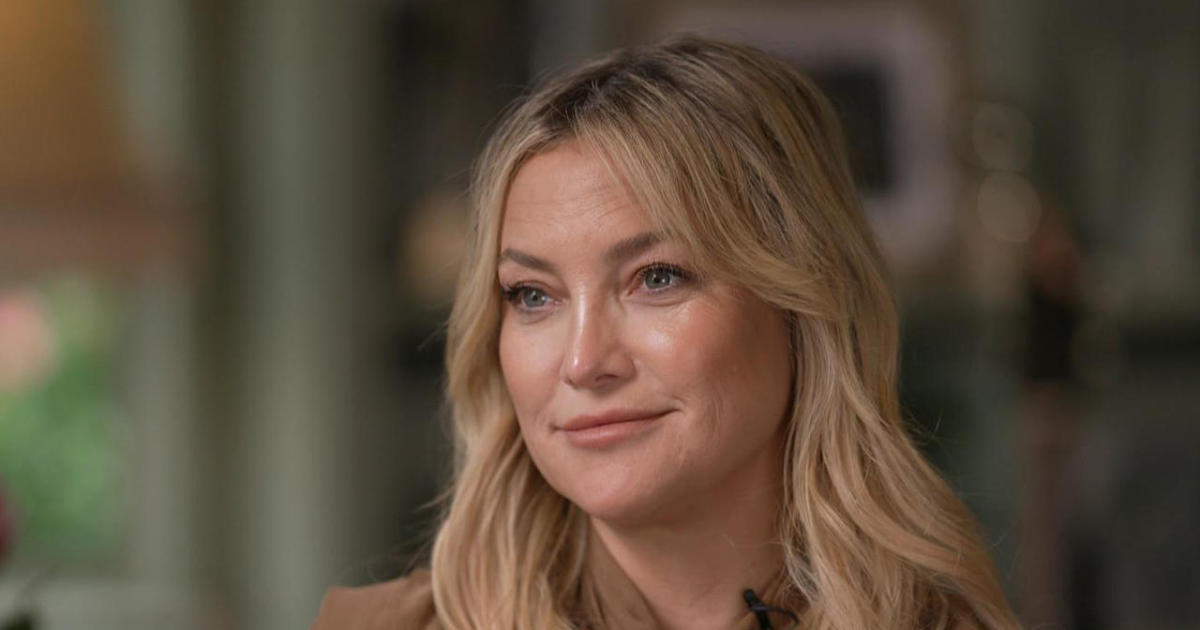
Kate Hudson says her relationship with her father, Bill Hudson, is "warming up"
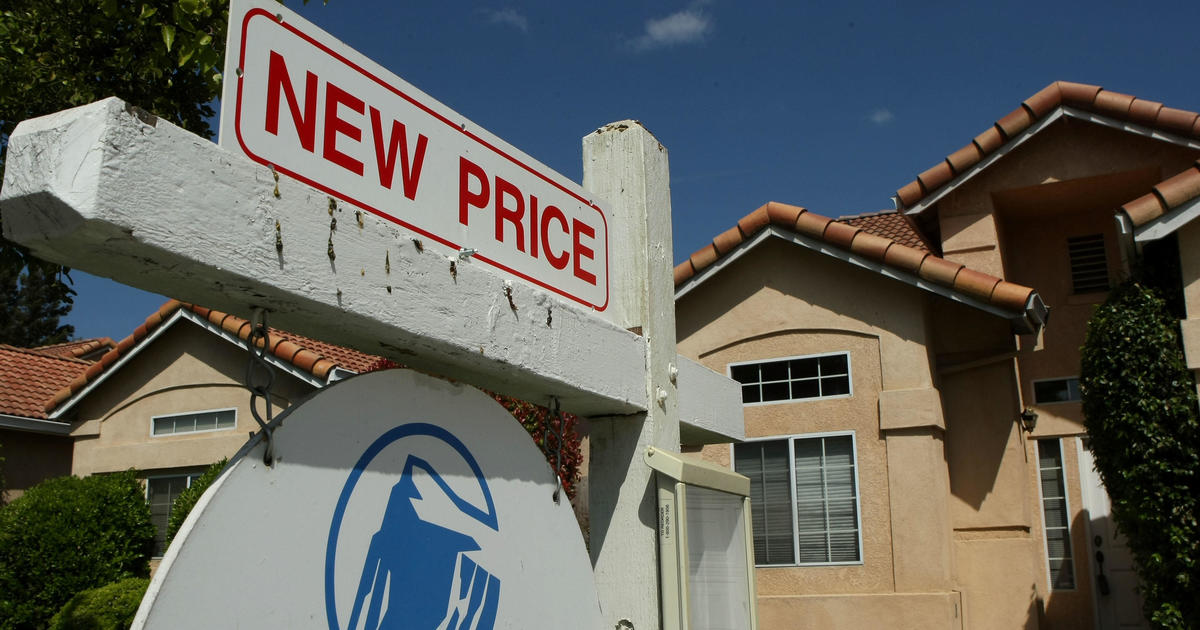
Cost of buying a home in America reaches a new high, Redfin says

This week on "Sunday Morning" (April 28)
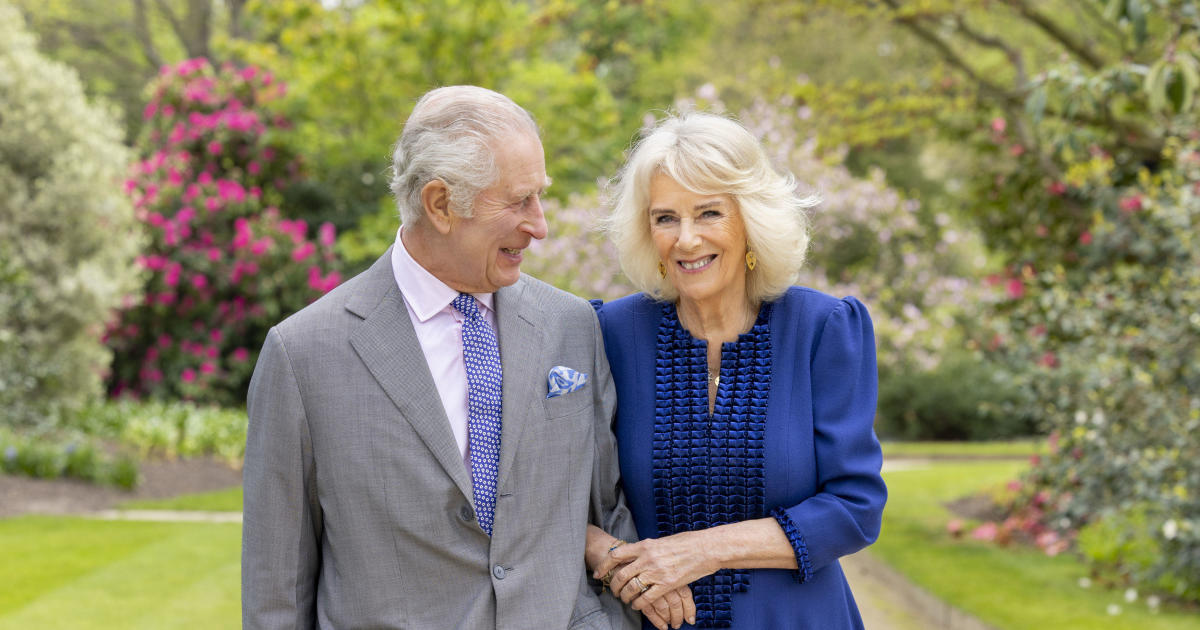
King Charles III to resume royal duties next week after cancer diagnosis
- Press Releases
Investigation: Air quality on Carnival Corp cruise ships can be worse than some of world’s most polluted cities
January 24, 2019.
Air pollution levels put health of passengers, staff, port communities at risk, according to report by Johns Hopkins University researcher
SAN FRANCISCO, CA — A new investigative report released today details the shocking findings of a two-year study exposing extremely poor air quality on four Carnival Corporation ships that can be worse than some of the world’s most polluted cities including Beijing, China and Santiago, Chile.
- Read the full report online
- Watch a recording of the press conference
- Read a summary of the report’s methodology and conclusions
- See undercover photo and video from one of the cruise ships
The report, titled “An investigation of air pollution on the decks of 4 cruise ships” was authored by Dr. Ryan Kennedy, an assistant professor at the Johns Hopkins University Bloomberg School of Public Health. The study was commissioned by international environmental organization Stand.earth.
“More than 30 million people worldwide are expected to go on a cruise in 2019, and these cruise passengers and staff may be exposed to concerning levels of air pollution that could impact their health. Despite being on the open sea, they can be breathing dirty air worse than some of the world’s most polluted cities,” said Dr. Ryan Kennedy, a researcher at the Johns Hopkins University Bloomberg School of Public Health.
ULTRAFINE PARTICULATE POLLUTION
The study measured ultrafine particulate pollution from multiple locations on four cruise ships, both in port and at sea over multi-day cruises. The ships — operating under the Carnival, Holland America, and Princess lines — left from Port Canaveral, Florida to the Bahamas; from Galveston, Texas to the Western Caribbean and Mexico; from Vancouver, British Columbia to Los Angeles, California; and from Los Angeles, California, to Mexico.
While less studied than fine particulate pollution, ultrafine particulate pollution can be detrimental to human health because of the increased toxicity. Ultrafine particles can have thousands of times more surface area than fine particles and are small enough to be inhaled into a person’s lungs and move into the bloodstream, where they can cause higher rates of cardiovascular disease and asthma. Recent studies have suggested that ultrafine particles may be the most dangerous to human health , and that particulate matter from ship exhaust may be to blame for tens of thousands of annual deaths .
“Extremely high levels of air pollution measured on these Carnival Corporation ships suggest this pollution could pose serious health risks to passengers, staff, and people living in port and coastal communities. The most shocking finding from this study is that pollution was often highest near the stern of the ships, where passengers are encouraged to exercise. This study should be a warning sign for anyone considering booking a cruise, but especially for vulnerable groups such as the elderly and young children or anyone with cardiovascular problems,” said Kendra Ulrich, Senior Shipping Campaigner at Stand.earth.
HEAVY FUEL OIL
One of Stand.earth’s core programs works to reduce the climate and human health impacts of the shipping industry. Stand.earth is urging Carnival Corporation to transition away from using heavy fuel oil (HFO) to power its ships and immediately switch to a cleaner-burning fuel while installing filters to help reduce ultrafine particulate pollution. Ultimately, Stand.earth wants Carnival Corporation, the world’s largest cruise operator, to transition away from fossil-fuel powered ships completely.
“Carnival Corporation claims sustainability and human rights are core company values, but its policies continue to threaten its clients and the environment. Most of Carnival’s global fleet burns heavy fuel oil — the dirtiest fossil fuel available for marine transportation. This study exposes the health consequences of using this bottom-of-the-barrel oil coupled with inadequate pollution filters, simply because it’s dirt cheap. Carnival’s own customers could be subsidizing the company’s profits with their health,” said Ulrich.
STUDY CONCLUSIONS
Some of the findings from the study include:
- While all four ships were traveling at sea, average particle counts were significantly higher in the areas behind the smokestacks (stern).
- Particle counts on the Holland America MS Amsterdam were approximately eight times higher on the stern areas than on the bow.
- Particle counts on the Carnival Freedom measured as high as 73,621 particles per cubic centimeter (pt/cc) near the running track while at sea.
- Particle counts on the Princess Cruises Emerald Princess measured as high as 157,716 pt/cc on the lower stern while at sea.
In comparison, pollution measurements taken with the same equipment in Beijing, China in 2009 were 30,000 pt/cc on a busy street, and in Santiago, Chile in 2011-2012 were in the ranges of 8,000-30,100 pt/cc.
In addition to the report’s documented air pollution impacts on cruise passengers and staff, studies have shown approximately 70% of ship emissions occur within 250 miles of land , potentially exposing millions of unsuspecting people to dangerous air pollution levels and raising serious health concerns for coastal cities and port communities.
CRUISE SHIP SCRUBBERS
All four ships in this study have scrubbers installed, an exhaust-cleaning technology designed to reduce sulfur air emissions. This allows the ships to burn heavy fuel oil inside most of the North American and Caribbean Emissions Control Areas, where there are strict limits on emissions. In California, where scrubbers are banned within 24 miles from shore, ships are required to switch to a cleaner-burning fuel.
“Carnival claims its scrubbers significantly reduce air emissions. This report’s continuous elevated readings indicate that even in California, where Carnival Corporation is required to switch to a cleaner-burning fuel, air pollution on board remains a serious concern. That’s why Carnival must not only switch to a cleaner-burning fuel, but also install adequate pollution filters to help prevent this dangerous ultrafine particulate pollution from impacting the health of its passengers and staff,” said Ulrich.
As air pollution becomes an increasing concern for global health officials — including the head of the World Health Organization who recently called air pollution “the new tobacco” — Carnival’s use of heavy fuel oil is putting human health at serious risk.
- Read the full report online at https://www.stand.earth/sites/default/files/2019-an-investigation-of-air-pollution-on-the-decks-of-4-cruise-ships.pdf .
- Read a summary of the report’s methodology and conclusions, and get more information about Carnival Corporation, cruise ship scrubbers, and Carnival’s environmental record: https://docs.google.com/document/d/1hMQeGSKRzN8scmhvHi82Lm2FtCqEfKKyO53TNHEZn4Q/edit?usp=sharing
- See undercover photo and video from one of the cruise ships: https://drive.google.com/drive/folders/1JpyA4gq424r04-99H7QbjkrkBJffxp4e?usp=sharing
Media contact: Virginia Cleaveland, Press Secretary, [email protected] , 510-858-9902 (US) or 778-984-3994 (Canada)

At COP28 civil society calls for exclusion of big biomass from global renewable energy target
New forest surveillance system exposes ongoing old growth logging in British Columbia, amid ongoing calls for transparency

Stand.earth’s Richard Brooks to speak on Bloomberg Sustainable Finance Forum panel alongside Citi and Natixis executives
Put your cruise on silent mode, please: Why ships need to curb noise pollution

When Carnival Corp. ships sail into Glacier Bay National Park and Preserve , a protected area teeming with wildlife and striking landscapes, they go into quiet mode.
The vessels don't make any announcements on outside weather decks, and they also slow down from between 14 and 18 knots – between roughly 16 and 21 mph – to often less than 10 knots.
That way, passengers can see animals like seals lounging on bergy bits, while the ship minimizes disruptions to the marine environment.
“Most often, the ship can transit in a place like Tracy Arm or Endicott Arm or Glacier Bay, and typically, we don't see any of the seals move at all,” said Patrick McGuire, vice president of environmental operations and policy for the company’s Holland America Group, which is comprised of Holland America Line, Princess Cruises, Seabourn and P&O Cruises Australia. “So, that's certainly our objective is to not have any noisy interference with marine mammals because that's what everyone comes to see.”
Those kinds of measures are among a number of steps cruise lines have taken to reduce noise pollution from their ships, which has become a point of increased focus in recent years for many cruise lines.
How do cruise ships create noise pollution?
Sound is a common sensory modality for animals underwater, according to Leila Hatch, Research Ecologist with the National Oceanic and Atmospheric Administration's Office of National Marine Sanctuaries, specializing in underwater sound monitoring and management.
“As light degrades, sound travels really efficiently over really large distances, and particularly sounds that are ... low tones on the piano or lower frequency,” she said. A wide range of creatures, from invertebrates to whales, use sounds to communicate with one another and pick up other cues, such as when predators or prey are close by.
Can we have eco-friendly cruising? What to know about zero-emission ships
Large commercial ships, meanwhile, are the dominant human-generated contributors to low-frequency noise across ocean basins, which can interfere with animals’ ability to hear signals they need to detect. Oceangoing traffic can also add to coastal noise from smaller regional and local vessels in areas like traffic lanes approaching ports.
A ship’s propulsion system is the main culprit in emitting underwater noise, though other machinery can create a vibration that can transmit noise beneath the surface too.
Are cruise ships the main source of noise pollution?
Passenger cruise ships represent significantly less than 1% of all oceangoing vessels, according to Cruise Lines International Association, the industry’s leading trade group. However, Hatch noted that in popular cruise destinations, those ships may make up a larger portion of ships in the area.
Animals in more remote places may also be at higher risk of complications from noise pollution, but that doesn’t mean those living in urbanized environments are accustomed to it.
“Marine animals that depend on habitats where vessel noise levels are persistently high are documented to show higher stress rates, elevated predation risk and lower foraging success,” Hatch said. “These are chronic conditions that become particularly concerning if animals are already vulnerable or endangered. In areas where vessel noise levels have historically been low but traffic is increasing, such as a warming Arctic, animals have the potential for heightened disturbance as they encounter more commonly what has until now been rare noisy events.”
How are cruise ships reducing noise pollution?
Carnival Corp. and Holland America Group have developed protocols for sensitive areas, McGuire said.
Before operating in Glacier Bay, which already limits cruise ship entry to two per day, they conduct underwater sound profiling for the first vessel in each new class by sailing at different speeds, as part of a concession agreement with the National Park Service.
The process is done under the auspices of the Naval Surface Warfare Center, which sends the results to both Carnival Corp. and the park service, and ships are tested at various speeds.
When ships go at higher speeds of around 18 knots, McGuire said propeller cavitation – when vapor bubbles form and dissolve, inhibiting performance and creating noise – is the predominant audible sound source. At lower speeds, the rotation of diesel generators or motors powering functions like air conditioning shows up more clearly. That information allows the operator to evaluate the noise coming from a ship and adjust plans as needed.
Holland America Group cruise lines have measured ship noise in other ways too.
Seabourn Venture, an expedition ship optimized for sailing in polar regions, marked its first class to have its underwater noise level certified by a classification society when the vessel launched in 2022. The voluntary process provides operators with notations that a ship operates within a given sound range.
“So … because these vessels are designed to operate in sensitive areas, we've taken particular attention to have that noise profile measured as well,” McGuire said. Venture’s underwater sound levels came in under the relevant standard, he added.
MSC Cruises has also received “underwater radiated noise” notations for its MSC Grandiosa, MSC Virtuosa, MSC World Europa, and MSC Euribia ships, according to Linden Coppell, MSC Cruises’ vice president of sustainability & ESG.
Down the coast from Glacier Bay, Holland America Group ships also cooperate with the Enhancing Cetacean Habitat and Observation Program led by the Vancouver Fraser Port Authority, which includes several voluntary initiatives to reduce underwater noise from large commercial vessels.
In the waters around northern Washington and southern British Columbia, ships turn off their ultrasonic anti-fouling systems, McGuire said, which help prevent unwanted organisms from attaching to a ship’s exterior, Hatch noted that ultrasonic anti-fouling systems have become increasingly prevalent on cruise ships and other kinds of vessels over the last two or three years, and are “causing some concern in the scientific community” as they emit sounds at a frequency that disturbs some toothed whale species.
“The ECHO Program is aware some ships are equipped with ultrasonic anti-fouling systems and has discussed with some operators the benefits of disabling the technology when transiting through southern resident killer whale critical habitat to further reduce underwater noise,” a spokesperson for the Vancouver Fraser Port Authority said in an email.
Other initiatives aimed at reaching sustainability goals, such as plugging into shore power in port so ships can turn off their engines, have the added benefit of reducing noise, though they may be limited in scale.
Less than 2% of cruise ports worldwide have on-shore power capabilities, though that number is expected to increase to 3% by 2025, according to Cruise Lines International Association’s 2023 State of the Cruise Industry report. Among its member ships, more than half will be equipped to plug into shore power where available by the end of this year.
Coppell said MSC also works closely with shipyards to identify opportunities to further reduce inefficiencies, which she said are often associated with noise. “(With) every ship, there's going to be potentially incremental improvements,” she said.
Those advances may be increasingly important.
“With a larger human population and the globalization of goods, the projectile for how much sound from vessels is in the world's oceans is sort of ever-growing,” Hatch said.
NOAA works to highlight the circumstances that may pose risks to marine life, Hatch said.
"(Noise) has increasingly well-understood physiological consequences for animals, and if they are already having a hard time making a living in the ocean, then that is a stressor we have to address," she said. "We have to figure out ways to improve the quality of that habitat."
Nathan Diller is a consumer travel reporter for USA TODAY based in Nashville. You can reach him at [email protected].
- International edition
- Australia edition
- Europe edition
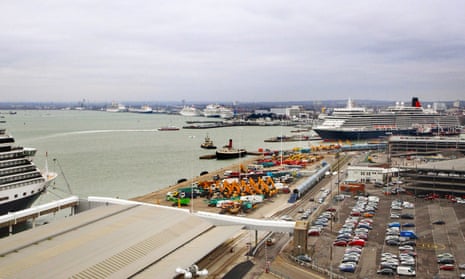
Cruise ships polluting UK coast as they ignore greener power options
Most liners rely on marine gas oil when docked, despite claims they reduce emissions by plugging into low-carbon electricity
Cruise ships visiting Britain are frequently failing to plug into “zero emission” onshore power and instead running their engines and polluting the local environment with fumes.
The industry is under scrutiny over air pollution and contribution to greenhouse gases, with some European cities banning vessels from central ports . Cruise operators say ships can reduce emissions by switching off engines and plugging into low-carbon electricity when moored. But an investigation by openDemocracy has found that cruise ships regularly fail to use onshore power at Southampton, Britain’s largest cruise port.
They instead rely on marine gas oil, which contributes to local air pollution, or liquefied natural gas (LNG), which has lower air pollutants but leads to some methane being emitted into the atmosphere. Both fuels contribute to greenhouse gas emissions.
An analysis of ship schedules at Southampton found that between April 2022 and July 2023, there were about 300 days when at least one cruise ship was docked at the port, but the onshore power facility was only used 71 times over the same period.
Some ships have not been adapted to use cleaner onshore power, but the UK Chamber of Shipping says one factor is cost, because onshore power is more expensive than marine fuel. Cruise firms can also pay for their ships to be retrofitted with new technology so they can use cleaner onshore power.
Jon Hood, UK sustainable shipping manager at Transport & Environment (T&E), Europe’s leading clean transport campaign group, said: “There’s clean power available but the cruise companies don’t want to pay for it.”
He said greater transparency was required and cruise operators should be forced to disclose when they use onshore power and for how long, and that the government should require cruise ships to plug into onshore power when it was available.
Katherine Barbour, Southampton’s first Green party councillor, said: “If cruise liners aren’t mandated to change, this will continue and our residents will suffer. We need all berths to be able to provide onshore power, and ships need to be adapted to use it.
“Every ship is like a small town, spewing out pollution when they are not using electricity.”
The New York Times reported in December 2019 that a single docked cruise ship can emit in a day as much diesel exhaust as 34,400 idling lorries, but that that was almost eliminated with onshore power. The cruise industry says the analysis does not consider advanced technologies on cruise ships used to reduce emissions, the use of alternative fuels, or restrictions on emissions in ports.
While cruising is one of the fastest growing tourism sectors, with 31.5m passengers forecast for 2023, there are concerns about its environmental impact. A study published in the journal Marine Pollution Bulletin in December 2021 found a large cruise ship could have a carbon footprint greater than 12,000 cars. An analysis published in June by T&E found that despite the introduction of a new cap of sulphur in marine fuels in 2020, 218 cruise ships operating in Europe in 2022 emitted more sulphur oxides than a billion cars .
In 2021, Venice banned cruise ships from its historic centre. Amsterdam banned cruise ships from its centre earlier this year and Barcelona followed suit from 22 October.
The industry also says it is committed to greener practices, with a target of net zero carbon cruising by 2050. Carnival Corporation, the world’s largest leisure travel company, is building new ships powered by LNG, and cruise operators are also conducting trials with biofuels. New LNG engines reduce emissions of sulphur oxides but campaigners say the engines and the fuel production process leak methane, an extremely potent greenhouse gas.
after newsletter promotion
In April 2022, Associated British Ports (ABP), which operates the cruise cruise port at Southampton, announced the launch of an onshore power facility offering “zero emissions at berth”. The project cost £9m, supported by £4.4m from the Solent local enterprise partnership, which has significant public funding. But only one ship can plug into that facility at a time.
The 2022 Solent LEP annual report said shore power had saved 1.7m kg of CO 2 in a year; that is only a fifth of the annual savings predicted by ABP in its business case submitted to the LEP to obtain the £4.4m grant. ABP said implementation takes time to “work up”.
The Cruise Lines International Association says 46% of its member fleet can connect to shoreside electricity. It said in September that 32 ports had at least one cruise berth with shoreside power, and plugging in could reduce emissions by up to 98%. A spokesperson said: “Connecting to shoreside electricity is a long-term element in the cruise industry’s decarbonisation strategy.”
ABP said: “ABP Southampton is proud to be a UK leader in the provision of shore power. It’s a service to our shipping customers that we want to grow. We see shore power as an integral part of the transition to net zero for both ABP and our customers.
“The port of Southampton has a UK-leading air-quality improvement and emissions reduction strategy, backed by a network of air quality monitors around the port. Real world air-quality monitoring research by Southampton city council demonstrates that air quality levels for port-related emissions are a fraction of other sources such as traffic.”
Port officials say there are various factors involved in the use of the onshore power facility, which may include the fact that UK power costs are some of the highest in Europe. ABP said it planned to publish a 2023 shore-power performance review early next year, with its air quality update.Carnival Corporation said: “We use shore power in ports wherever available and operationally possible. However, despite the benefits, just 2% of the world’s ports have at least one cruise berth equipped with onshore power.”
- Shipping emissions
- The Observer
- Air pollution
- Shipping industry
Most viewed

Carnival Cruise Line pushes back on controversial onboard issue
C ruise lines operate each cruise as its own business more or less. The cruise operators track their costs and balance that against the value of the tickets sold, the various onboard extras people pay for, and any other revenue that comes in.
Some costs are fixed. You can't really change the size of the crew on a cruise-by-cruise basis. The same goes for fuel and onboard entertainment. Royal Caribbean has to pay the pub guitarist even if the pub is empty, and Carnival Cruise Line ( CCL ) has to pay its singalong piano bar players whether or not that venue draws a crowd.
Related: Carnival Cruise Line confirms ban on a popular cabin hack
There are, however, some costs the cruise lines have choices about. Before the pandemic, Royal Caribbean ( RCL ) showed movies all day on the big screen on ships that have a screen on the pool deck. It showed the movies that played in that spot at night more as background content.
Since the Covid restart, the cruise line now only shows movies at select times. That's a budget-saving measure that likely has not annoyed many passengers because it still offers recently-in-theaters films, at night, just not all the time.
The same logic applies to sports programming. Royal Caribbean and Carnival, on their namesake brands, generally have the big games and the playoffs, but they might not have every game customers wish to see.
That's because they're making choices as to which networks they license and that may leave them with coverage holes. Both cruise lines also have a fairly limited selection of television channels offered in passenger cabins and that's something some cruisers have complained about.
Carnival pushed for more TV choices
Some cruise ship passengers never use the television in their cabin while others like to use it to watch the in-house programming. Both Carnival and Royal Caribbean have channels devoted to on-ship programming which often includes a daily show featuring the cruise director, as well as channels dedicated the excursions and booking future cruises.
There are, however, passengers who like to keep track of the real world while at sea, and one of those cruisers reached out to Carnival Brand Ambassador John Heald.
"John Heald. Talk to the beards as you call them and tell them this. We need the main networks plus Fox News in this election year in the states. Plus we want USA Network, HBO, FX. As you guys are too cheap to pay for it make it known there should be an option of say $20-$100 Increase in the cost of the cruise. And add on like the internet or Cheers. That kind of thing. 90% would pay for an add-on like this," M wrote.
It's worth noting that the cruise lines generally do not have the ability to license television networks on a per-person basis. They either pay to have the channel on the ship, or they don't.
Selection, however, can vary by ship. Royal Caribbean ships, for example, that don't have the Playmakers Sports Bar have a thinner selection of sports channels offered in-cabin.
Carnival's Heald gives an answer, asks a question
"Well as I have mentioned many times before, the cost of these kinds of channels is massive," Heald wrote.
He then posed a question to his followers and got over 3,400 responses.
"Do you agree? Would you ever want to pay an extra fee for these kind of stations?" he added.
The results were mixed, but nobody seemed to like the idea of paying more for a bigger selection of channels.
"No! Vacation is disconnected time," Colleen Halleran Coon answered.
That was a very popular answer, but it was not universal.
"Yes, I would like more channels on the TV. I like to watch a little TV before bed," Beth McDonald wrote.
Barbara Thibault shared a practical approach.
"I would record everything I wanna watch. I'll watch it when I get home," she shared.
A few people did like "M's" idea.
"Yes, I would pay extra to have extra channels as I like to watch the news while having coffee and my travel partner is a late sleeper," wrote Shirley Abts.
"Yes, I sure would. Vacation is whatever you make of it and enjoy. I don't drink but I don't care that you have all the bars. I do enjoy lounging letting my mind rest and watching TV in the morning and evening," Travis Lester added.
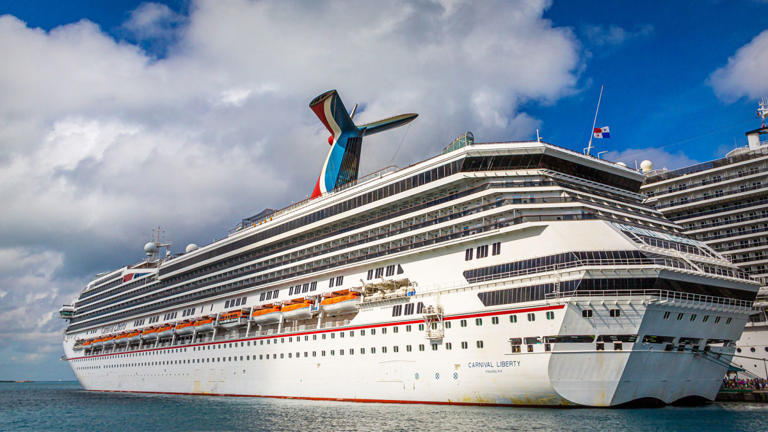

IMAGES
COMMENTS
Carnival is the parent company of major cruise lines like Carnival Cruise Line, Princess Cruises, P&O Cruises, and Holland America. Those cruise lines have all come under scrutiny over pollution ...
The company has a long history of dumping plastic trash and oily waste from its ships, with violations dating back to 1993. In 2016, its Princess subsidiary agreed to pay $40 million for pollution.
A recent study found 63 cruise ships owned by Carnival Corporation emitted 43% more sulfur oxide in 2022 than all the 291 million cars in Europe. Menu icon A vertical stack of three evenly spaced ...
Jesus Aranguren/Associated Press. By Sarah Mervosh. June 4, 2019. In 2016, Princess Cruise Lines agreed to pay a $40 million penalty for illegally dumping oil-contaminated waste into the sea and ...
The $40 million penalty in 2017 was the largest-ever fine for intentional pollution from a ship. ... The cruise ship Carnival Miracle sits in fog at the port of the Long Beach, California. ...
Princess Cruise Lines Ltd. (Princess) has agreed to plead guilty to seven felony charges stemming from its deliberate pollution of the seas and intentional acts to cover it up. Princess will pay a $40 million penalty- the largest-ever criminal penalty involving deliberate vessel pollution - and plead guilty to charges related to illegal dumping of oil contaminated waste from the Caribbean ...
Cruise Ship Pollution: What Goes in Must Come Out Prior to the COVID-19 pandemic, millions of Americans took cruise vacations every year. Yet, ... During Carnival's probation, their cruise companies violated federal environmental law by dumping wastewater, oil and plastic into the ocean and polluting our air. Without court
Violations go back to 1993, and they've continued in recent years. Two years ago, Carnival agreed to pay a $40-million fine after one of its ships on the Princess line was caught dumping oily ...
Carnival Corp. reached a settlement Monday with federal prosecutors in which the world's largest cruise line agreed to pay a $20 million penalty because its ships continued to pollute the oceans ...
A Carnival cruise ship. In 2011, Carnival consumed 25m metric tonnes of water and 3,394,214 metric tonnes of fuel. ... The cost of reducing pollution. However, the 42 ships due to be retrofitted ...
Carnival pleads guilty to pollution, probation violations; cruise line fined $20M. MIAMI - Carnival Corp. reached a settlement Monday with federal prosecutors in which the world's largest ...
Barcelona ranks as the worst-affected port city in Europe for sulphur emissions, with a total of 805 port calls by cruise ships leading to 18 tonnes of sulphur oxides being released into the ...
Carnival Corp. has reached a settlement with federal prosecutors in which the world's largest cruise line agreed to pay a $20-million US penalty because its ships continued to pollute the oceans ...
A study of 203 cruise ships at sail in Europe in 2017, carried out by the European think-tank Transport & Environment, found that of the 20 most polluting cruise ship lines, seven were operated by ...
And because we know that cruise ship pollution is toxic throughout the entire industry, we thought we'd push away from the traditional statistics and provide more specifics about each of the top cruise lines. Carnival Corporation Environmental Impact. Carnival Corporation is the biggest cruise company in the world with 10 cruise lines and is ...
The paper, " Environmental and Human Health Impacts of Cruise Tourism: a Review", published in the Marine Pollution Bulletin, estimates that 24 per cent of all waste produced by shipping comes ...
Carnival Corp and Royal Caribbean Cruises do a poor job of limiting the pollution from their ships, according to the environmental-advocacy group Friends of the Earth.; The group graded 16 cruise ...
Carnival's Princess Cruises will pay a $40 million fine for dumping oily waste into the ocean - the largest penalty of its kind in history. The company also pleaded guilty to seven felony ...
In 2016 a Carnival Cruise subsidiary was handed a $40m fine when it was found crews aboard ... but for her it's been a "lovely holiday" and a "complete relief" from cruise ship pollution.
Air pollution levels put health of passengers, staff, port communities at risk, according to report by Johns Hopkins University researcher. SAN FRANCISCO, CA — A new investigative report released today details the shocking findings of a two-year study exposing extremely poor air quality on four Carnival Corporation ships that can be worse than some of the world's most polluted cities ...
Norwegian Dawn and Carnival Dream moored alongside in New Orleans (2015). Cruise ships carrying several thousand passengers and crew have been compared to "floating cities," and the volume of wastes that they produce is comparably large, consisting of sewage; wastewater from sinks, showers, and galleys (); hazardous wastes; solid waste; oily bilge water; ballast water; and air pollution.
0:03. 0:40. When Carnival Corp. ships sail into Glacier Bay National Park and Preserve, a protected area teeming with wildlife and striking landscapes, they go into quiet mode. The vessels don't ...
An analysis of ship schedules at Southampton found that between April 2022 and July 2023, there were about 300 days when at least one cruise ship was docked at the port, but the onshore power ...
The 71,909-gross-ton, Fantasy-class Carnival Elation is one of the oldest ships in Carnival Cruise Line's fleet and has been welcoming guests since 1998. The ship has been upgraded and refit ...
Carnival rescues Cuban refugees. Cruise ships somewhat regularly come upon situations at sea where they need to offer aid, That's a law, not a decision, according to Carnival brand ambassador John ...
Carnival pushed for more TV choices . Some cruise ship passengers never use the television in their cabin while others like to use it to watch the in-house programming.